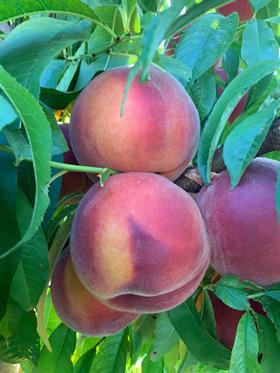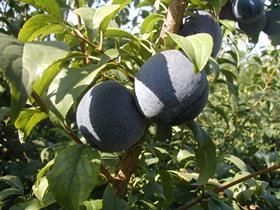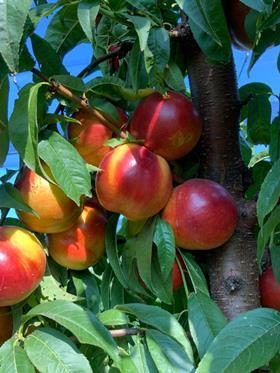One of Europe’s leading grower organisations uses new agronomic techniques to save significant amounts of water and fuel, while stonefruit trees help reduce carbon dioxide emissions
Less water, less energy, less carbon dioxide. Peaches, nectarines, plums and apricots can help to combat climate change, as demonstrated by the field research carried out by Apo Conerpo, Europe’s leading fruit and vegetable grower organisation.
Thanks to the good agronomic practices promoted among its members, high-quality summer fruit can be produced using up to 50 per cent less water, limiting energy expenditure for fuels, providing a 60 per cent reduction in the carbon dioxide produced by the cultivation process, and even immobilising hundreds of thousands of tonnes of CO2.
A further step forward in demonstrating how planet Earth can count on a great barrier to defend the environment, namely the cultivation of fresh produce in Europe;

That defensive barrier is currently being promoted by In&Out, a marketing campaign co-financed by the European Union with the aim of enhancing the quality, wholesomeness and sustainability of fruit and vegetables grown in the European Community.
“The water and energy problem grows increasingly pressing,” comments Davide Vernocchi, president of Apo Conerpo, “and added to these is the serious issue of rising temperatures, which also has harmful effects on agricultural production.”
More and more frequently, the cultivation of produce is wrongly singled out as a cause of the problem, accused of wasting water, polluting the environment with pesticides and depleting the soil.
“But the truth is very different,” he continues. “For over 20 years, Apo Conerpo has been using the model of integrated growing, a set of agronomic practices that make it possible to reduce and streamline the use of chemicals, apply methods with low environmental impact, and at the same time obtain high-quality products.”
He adds: “Today, thanks to the commitment of our members, orchards are employing specific techniques that allow us to be even more virtuous in terms of saving water and reducing emissions of climate-altering gases, while saving energy, fuel and pesticides. Stonefruit – peaches, nectarines, apricots and plums – are an excellent example of the results of this commitment.”

Integrated production cuts emissions
Some of the most appreciated summer fruits, stonefruit have been the subject of in-depth research. “The study we carried out compared different methods of producing stonefruit”, explains Monica Guizzardi, head of Apo Conerpo’s technical office. “Traditional cultivation, so to speak, without any special care of for the environment, and cultivation following the model of integrated production – to which a series of good agronomic practices have also been applied, which we promote and spread among our members.”
The results are crucially important, she says. “While with traditional growing methods, we found that 0.13kg of carbon dioxide was produced for each kilo of peaches, in integrated production with good practices, this value dropped to 0.05kg for each kilo of fruit, 62 per cent less.”
The same was true for water consumption, she notes. “This went from 195dm3 per kg of peaches to just 101dm3 – practically 50 per cent less thanks to the application of increasingly precise technologies such as sensors in the soil, which detect the exact amount of water that plants require for the fruit to develop ideally. In a period of prolonged drought like the one we are dealing with, this savings has a great impact.”
There are other substantial savings to be made in terms of inputs. “With techniques such as sexual confusion [to disrupt insects], it is possible to reduce the number of treatments with pesticides to protect plants from pests. In concrete terms, this means a 50 per cent reduction in the use of atomisers in the orchards, with significant financial and environmental savings in fuel.”

But what do we mean when we talk about ‘good practices?’ Guizzardi explains: “We are referring to a series of agronomic techniques that aim to reconcile some of the most intensive produce growing in Europe with protection of the environment and consumer health.
“This means not only respecting the limits for the use of fertilisers provided for by the regional regulations but also, just to name a few, employing specific equipment and installations to minimise water consumption, using traps for pest monitoring and applying sustainable control methods such as the aforementioned sexual confusion in order to minimise plant protection treatments, and taking advantage of the opportunities offered by precision agriculture. This way, we have better, higher quality production while protecting the environment.”
In other words, environmentally friendly stonefruit. “In the fight against climate change, it is crucial to reduce the emissions of climate-altering gases,” Vernocchi concludes. “This is why it is important to remember the carbon storage activity of the plants in our orchards. It is estimated that our fruit trees remove more than 400,000 tonnes of carbon dioxide from the atmosphere every 12 months, a value equal to the annual emissions of over 30,000 people or those of 13m km travelled by a commercial airliner.
“In this context, stonefruit plays a prominent role. We can estimate that for every tonne of peaches produced by Apo Conerpo members, there is 24kg less carbon dioxide in the atmosphere.”




